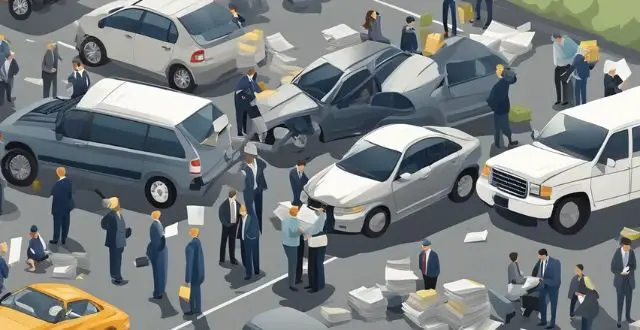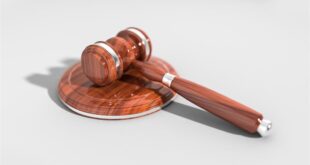Picture yourself enjoying your preferred drink when suddenly, you experience a rear-end collision, thrusting your day into chaos. Now, aside from contending with a damaged vehicle, you might find yourself grappling with unexpected discomfort.
Here comes the legal advocate for car accidents, essentially embodying the role of your individual guardian in formal attire (or perhaps in a more relaxed business attire—it is the modern era, after all).
These legal experts arrive with expertise extending beyond mere familiarity with traffic regulations and courtroom theatrics.
So how does your personal injury attorney, in representing those injured, navigate through the maze of paperwork, insurance jargon, and those sneaky loopholes that feel more confusing than assembling furniture without instructions? It starts with a free case evaluation, which is the legal world’s version of dipping your toes in the water.
Don’t let the “free” part fool you, though—it’s their gateway to understanding just how to tackle your case and, of course, a nifty way to woo you into their client fold.
A car accident lawyer doesn’t just shuffle papers and strut around in a courtroom. They play the chess game of legal strategy, considering every angle of your accident to secure the compensation you rightfully deserve.
From acting as your buffer against insurance giants to bringing in a network of experts to back your claim, your lawyer’s goal is to make sure the only thing you have to worry about is what to binge-watch while you recover. And trust me, with the right legal representation, the story often ends with the other side cutting the check, not you losing your sanity.
Understanding the Claims Process
So you’ve traded paint with another car and now you’re neck-deep in paperwork instead of the good ol’ daily grind. Here’s the lowdown on the legal limbo, known as the claims process:
Assessment of Fault and Liability
First thing’s first: who’s to blame? Not pointing fingers here, but the insurance company sure will. It’s crucial to determine fault, as it affects the liability and ultimately, who’s picking up the tab.
You’ll need a police report faster than you can say “fender bender,” because that’s your golden ticket. It usually includes witness statements and photos of the accident, which are like catnip for insurance adjusters—a.k.a., the folks deciding your claim’s fate.
Navigating Insurance Company Antics
Prepare yourself—insurance companies can be trickier than a squirrel on roller skates. They might give you the runaround or offer settlements quicker than greased lightning. Remember, their goal is to pay as little as possible.
You’ll want to engage with them like you’re dancing a tango—closely but always on your toes. Keep all your communications documented; it’s your shield against any curveballs they throw your way.
Steps in Filing a Claim
The moment you decide to file an insurance claim, it’s game on. Here’s a play-by-play:
- Contact Your Insurance: Ring them up faster than a kid calling dibs on the last cookie.
- Documentation Overload: Gather every scrap of evidence—doctor’s notes, a copy of the police report, witness contacts. The more, the merrier.
- Claim Evaluation: The insurance adjusters morph into Sherlock Holmes, analyzing your claim. It can feel longer than waiting for your favorite band’s reunion tour.
In short, your mission is to stay sharp, gather intel, and remember, in the world of claims, patience is not just a virtue, it’s a necessity. Good luck!
Negotiation Tactics for Maximum Compensation
When you’re in the ring with insurance companies, it’s all about bobbing and weaving with stellar negotiation tactics to land that knockout for maximum compensation. You’ve got to be a heavyweight champion in the art of persuasive dialogue and know exactly when to land your punches—or in legal terms, your points.
Crafting a Persuasive Demand Letter
Imagine your demand letter as the opening act—it’s got to warm up the crowd (which in this case, are those tough cookies at the insurance company). You’re crafting a story, the one where you’re the hero, undeservedly in distress, thanks to that fender bender.
Be detailed: list the facts, flash the extent of your injuries in bold, and shove the liability onto the other party with a nifty bullet list. This is your first swing at stating your demands, so make it count with a convincing narrative that makes them feel as if settling is their idea.
The Art of Settlement Negotiation
Now, let’s talk art—the Mona Lisa of negotiations, if you will. Your tools? Active listening and articulate arguing. Your canvas? The settlement battlefield. Use leverage like a pro by highlighting your strongest evidence and the weakest chinks in your opponent’s armor.
Sprinkle in a dash of empathy to sweeten the deal. Remember, your job is to make the opposition believe that giving you a fair settlement beats the unpredictable whirlwind of a courtroom battle.
Knowing When to Settle or Head to Court
Alright, here’s the million-dollar question: When do you shake hands and when do you gear up for war? If the settlement offer starts to resemble your best-case-scenario judgment—and minus the headache of court drama—it might be time to gracefully exit stage left with a win.
But, if the number on the table wouldn’t even cover your post-accident avocado toast addiction, it’s time to channel your inner legal gladiator and stride towards the courtroom gates.
Remember, you’re playing chess, not checkers. It’s all about strategy, timing, and knowing the value of your game pieces—or the compensation you rightfully deserve.
Strategic Legal Actions in Court
In the battleground of the courtroom, every move your lawyer makes is like a knight’s in a game of chess. The evidence is the king, and expert witnesses are the pawns marching to the beat of your legal strategy.
Effective Use of Evidence and Expert Witnesses
When you’re nursing wounds from a car accident, your lawyer is gathering a treasure trove of evidence. Photos, police reports, medical records – they’re not just paper; they’re your arsenal.
- Photos & Videos: A car’s skid marks on the tarmac don’t just tell a story, they scream it. A picture can be worth a thousand ouches.
- Medical Reports: Your doctor isn’t just a healer; in court, they’re the oracle whose words echo through the court’s walls.
- Witness Statements: Ever had a friend vouch for you? Well, in trial, these vouches can make all the difference, turning maybe into definitely.
Now, let’s talk expert witnesses. They strut into the courtroom, and suddenly, the jury’s ears perk up. With their impressive titles and even more impressive jargon, they translate your ouches and ahhs into cold, hard facts.
The Intricacies of Personal Injury Trials
Personal injury trials are a marathon, not a sprint, and your lawyer’s stamina is key. They navigate a maze crafted by legal precedents and procedures, all to get you to the finish line with your flags waving high.
- Trial Experience: Like a seasoned general, your lawyer maps out battle strategies. They’ve been here before, and their experience is your secret weapon.
- Litigation Tact: Each word your lawyer utters in court is a carefully placed step to sway the judge’s gavel in your favor.
Within the confines of the courtroom, your lawyer and the judge engage in a tactical dance—rarely seen on “So You Think You Can Dance”, but it’s even more thrilling to your legal tune.
The legal system may seem like a giant maze with invisible cheese at the end, but fear not, your lawyer knows the shortcuts. And remember, in this high-stakes game, evidence gathering and investigation are the spades to dig your way to justice.
Conclusion
Let’s be honest, after the thrill of a car chase in a summer blockbuster, the last scene you’d expect is our hero ringing up their lawyer to chat about insurance claims and injury compensation. But back in the real world, that’s exactly where the action leads if you’ve been in a fender bender—or worse.
So, what’s the gameplan after swapping paint with another car? Your lawyer’s got some clever maneuvers up their sleeve:
- Evidence Collection: Think of it like assembling the ultimate mixtape, but instead of 80s hits, you’re compiling police reports, witness statements, and photos of that dent shaped suspiciously like a villain’s profile.
- Negotiation Skills: Your lawyer transforms into a smooth-talking, hand-shaking negotiator, mastering the art of making insurance companies crack open their treasure chests.
- Courtroom Drama: If negotiations hit a wall, your lawyer’s ready to put on a performance that would have the crowd cheering, all to make sure you get your rightful due.
Remember, it’s not about the size of the dog in the fight—especially when your pup’s got a law degree. So buckle up, because with a good lawyer, your post-crash journey could be as satisfying as catching the bad guy and riding into the sunset. Minus the explosions, hopefully.
 khamush.com Lifestyle | Motivation | Poems
khamush.com Lifestyle | Motivation | Poems



